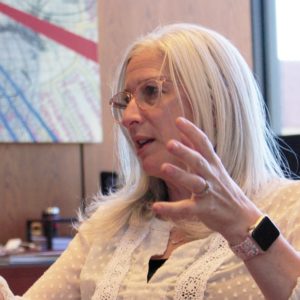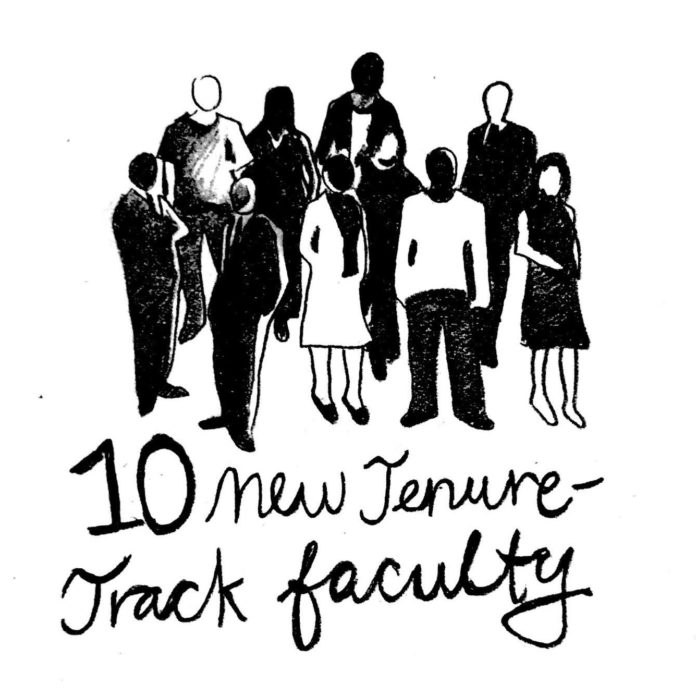Due to administrative changes surrounding the COVID-19 pandemic, Occidental has implemented a school-wide freeze on faculty hiring, according to an email sent by President Jonathan Veitch March 31. This freeze affects searches that would have begun during the 2020–2021 academic year, meaning new searches will not begin until further notice. 10 new tenure-track faculty members whose search processes were completed this academic year before the freeze was enacted will join the college, according to Vice President for Academic Affairs and Dean of the College Wendy Sternberg.
The decision to freeze hiring was made to help the school maintain a reasonable financial position, Sternberg said. The college made the decision as part of a series of choices that focused on maintaining the strongest financial position for when classes begin again in Fall 2020. According to Sternberg, administrators will be continually reevaluating the crisis to gauge when new faculty hiring searches will begin.
“All of this year’s tenure-track faculty searches already had been completed before the hiring freeze, so there will be 10 new tenure-track faculty joining us for the next academic year, as planned,” Sternberg said via email.

Most of the departments that conducted searches will add one tenure-track faculty member this year, while one department, Media Arts & Culture, is hiring two.
This time of year is when the deans and the president typically make decisions and extend offers to new hires. While new faculty hires vary per year, this year is considerably high, Sternberg said.
The process for finding new tenure faculty is a long, intensive process, according to John T. Lang, sociology professor and department chair. The process starts when a department drafts a 10-page report about what they need from a new hire and why it is necessary for the department. The goal of these proposals is to help the Academic Planning Committee make decisions on which departments are to begin the hiring process. This committee often receives many proposals, and it is their job to evaluate what is needed for the college as a whole, Lang said.
“At the end of the day, there are usually more position requests than we have funding to support,” Sternberg said. “The job of the Academic Planning Committee is to evaluate all of the proposals and make recommendations to myself, and I make recommendations to the president.”
Sternberg said that the planning committee rarely fully denies a request but instead adds recommendations to strengthen the proposal. Once a department’s proposal is approved, a search committee is put in place. According to Sternberg, the committee sometimes defers requests until the following year if they have already taken on too many searches. The number of searches varies per year depending on the needs of departments, based on retirements, number of students within a department and student interests.
For every department, a search committee is put together which includes members of the department, one member of a different department and one individual from the Affirmative Action Committee, according to Lang. By adding people outside of the department into the process, the college intends to include an unbiased point of view from someone who is not involved in the field. Biology professor Kerry Thompson is currently the acting head of the Affirmative Action Committee.
“We look for ways to contribute to the hiring process in a way that maximizes the diversity of the pool,” Thompson said. “We make sure that the file of each applicant is reviewed in an unbiased way. We train the search committees, depending on what department. We train them and identify cognitive errors that are common in the process of review.”
The national search is a long process, and while many apply and conduct different rounds of phone interviews, only a few make it to on-campus interviews and visit days, according to Sternberg. Candidates spend an entire day on campus giving talks, eating with students and sometimes substitute teaching a course, according to Lang.
Sternberg meets with every candidate from the searches — which can be as many as 40 to 50 people — when they arrive for visit days. The college conducts between eight and 10 searches with three to four candidates per search every academic year, Sternberg said.
Sternberg also said there are several reasons why many departments are currently in the search process, such as the high cost of living in LA and the fact that Occidental is at a demographic turning point.
“The demographics are such that we have a lot of faculty that are full professors nearing retirement age,” Sternberg said. “We are always going to have turnover in faculty just due to retirements.”
According to Sternberg, candidates rarely turn down an offer.
Professor Emily Goulding is a new non-tenure-track faculty member coming from Azusa Pacific University. Goulding started working at Occidental in January. She said that, as a third generation Los Angeles resident, it was her dream job to work at Occidental.
“I’m, by nature, an interdisciplinary, intersectional thinker, so I think about how media, politics, storytelling and social justice all come together,” Goulding said. “I love that Oxy’s in the middle of all of that in terms of its four pillars and values; also just the immense talent in the students and the bright, positive futures I see for them and their hard work, skill, analysis and determination. It’s really a privilege to teach here.”
Lang said he invites students to participate in the process in any way they can, most importantly by attending events with prospective tenure faculty members and offering their opinions to departments. This feedback helps the department make decisions about who to hire. Students can provide insight from a different perspective that faculty appreciate, Lang said.
“Students have a really important part to play in [the process],” Lang said. “No one’s asking you to be an expert at teaching, but you are an expert in what you know and like.”
![]()































